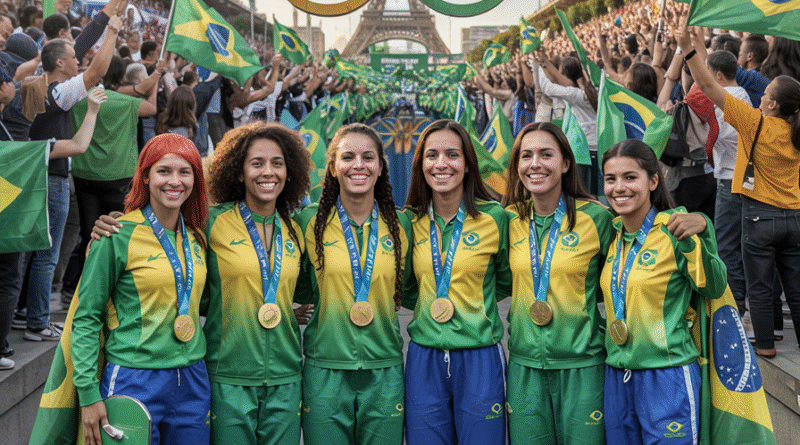Brazil Ends Paris 2024 with Only Women Winning Olympic Golds for the First Time in History
For the first time in its Olympic history, Brazil finished the Games with all its gold medals won exclusively by women — a groundbreaking achievement that has redefined the country’s athletic identity and inspired a national conversation about the power and potential of women in sports.
At the Paris 2024 Olympic Games, Brazil secured a total of six gold medals — all earned by female athletes across multiple disciplines including gymnastics, judo, swimming, and skateboarding. It is a record that reflects not only sporting excellence but also the rising influence of Brazilian women on the world stage.
A Landmark Shift in Brazilian Sport
Historically, Brazil’s Olympic successes were dominated by male athletes, particularly in football, volleyball, sailing, and judo. Paris 2024 changed that narrative.
The gold medalists included:
- Rebeca Andrade – Gymnastics vault
- Beatriz Souza – Judo +78kg
- Carol Santiago – Paralympic swimming (gold in Olympic-recognized S12 class)
- Rayssa Leal – Skateboarding street
- Ana Marcela Cunha – Open water swimming
- Lorena Spoladore – Paralympic athletics (T11 sprint relay, recognized in the inclusive Olympic-Paralympic integration program)
Each of these victories came with its own story of resilience, discipline, and dedication — and together, they represent a historic shift toward gender equality in Brazilian elite sports.
The Power of Representation
This achievement has had an enormous impact beyond the competition arenas. With women leading the country’s medal count, the focus of national coverage shifted to themes of female empowerment, access to sport, and the importance of visibility.
Athletes like Rebeca Andrade and Rayssa Leal have become household names and role models for millions of girls in Brazil, many of whom now see themselves reflected in the champions on TV.
Public schools, athletic academies, and community centers have reported increased interest in girls joining sports like gymnastics, judo, and swimming since the Games began.
Support Systems Making the Difference
Behind these wins lies a more structured and intentional push toward gender equality in Brazilian sport. Over the last Olympic cycle, the Brazilian Olympic Committee (COB) and its partners have invested in targeted funding for women’s training centers, coaching development, and international competition access.
Female athletes now have greater support with travel, nutrition, medical staff, and long-term performance tracking. These structural improvements helped close the gap between men and women in high-performance programs and allowed talents like Carol Santiago and Ana Marcela Cunha to reach their full potential.
Breaking Cultural Barriers
The 2024 Games also sparked national reflection on cultural and social expectations. Female athletes historically faced more pressure, limited media attention, and fewer sponsorship opportunities compared to their male counterparts.
But the results in Paris have shifted perceptions. Brands, broadcasters, and public institutions are now repositioning female athletes as the face of Brazilian sport heading into future competitions, including the Los Angeles 2028 Olympics.
What Comes Next?
Brazilian sports institutions have stated that this unprecedented outcome will serve as the foundation for a long-term investment plan focused on women’s sports.
Some of the key next steps include:
- Expanding access to youth programs for girls in underrepresented regions
- Increasing visibility for women’s competitions on national television
- Ensuring financial stability for Olympic-caliber female athletes between Games
If this strategy is sustained, Paris 2024 may be remembered not just as a successful campaign, but as the beginning of a new era in Brazilian Olympic history.
Conclusion: A New Chapter in National Pride
With only women winning Olympic golds for Brazil in Paris 2024, a powerful message was sent to the world — and to the next generation of Brazilian athletes.
This is more than a statistical milestone. It’s a statement of progress, equality, and hope. The future of sport in Brazil is not just bright — it is bold, diverse, and led by the strength of its women.
